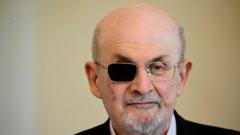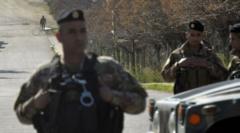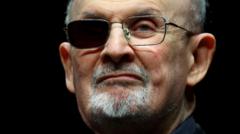The highly anticipated trial of Hadi Matar, the man accused of attempting to murder renowned author Salman Rushdie, is set to start soon in Chautauqua County Court, New York. Matar, 27, faces charges of attempted murder and assault stemming from the violent attack that occurred in August 2022, which left Rushdie blinded in one eye. Matar has entered a not guilty plea. The jury selection is expected to take place on Tuesday, marking a significant legal moment as Rushdie prepares to give evidence against his alleged assailant.
**Trial of Salman Rushdie's Accused Attacker Set to Begin Amid Controversies**

**Trial of Salman Rushdie's Accused Attacker Set to Begin Amid Controversies**
The trial of Hadi Matar, charged with stabbing author Salman Rushdie, is poised to commence in New York following multiple delays.
Matar's defense had sought postponements, citing potential prejudicial influence from Rushdie's forthcoming memoir about the attack. Additionally, they unsuccessfully pursued a change of venue, arguing the high-profile case warranted a more diverse jury pool than the predominately non-Arab-American population of Chautauqua County. Despite these legal maneuvers, the trial remains in the original jurisdiction.
Salman Rushdie, who endured devastating physical and psychological consequences from the stabbing, had been under a fatwa since the 1980s due to his novel "The Satanic Verses," which sparked significant backlash in the Muslim world. The story of his life and struggles continues to unravel as he prepares to confront his attacker in court.
Hadi Matar's alleged affiliation with Hezbollah complicates the context of the trial, as he faces separate federal charges linked to providing support to the militant organization. The upcoming proceedings promise to shed light on various cultural, political, and social dimensions surrounding the brutal assault on an iconic author who has long been a symbol of artistic freedom and the ongoing conflict over freedom of speech.
As the trial begins, the reactions from the public and media are likely to reflect deep-seated divisions regarding cultural representation, artistic expression, and the implications of violent extremism in modern society.
Rushdie's long-imposed silence is set to break, as he faces a pivotal moment that could significantly impact his life and work.
Salman Rushdie, who endured devastating physical and psychological consequences from the stabbing, had been under a fatwa since the 1980s due to his novel "The Satanic Verses," which sparked significant backlash in the Muslim world. The story of his life and struggles continues to unravel as he prepares to confront his attacker in court.
Hadi Matar's alleged affiliation with Hezbollah complicates the context of the trial, as he faces separate federal charges linked to providing support to the militant organization. The upcoming proceedings promise to shed light on various cultural, political, and social dimensions surrounding the brutal assault on an iconic author who has long been a symbol of artistic freedom and the ongoing conflict over freedom of speech.
As the trial begins, the reactions from the public and media are likely to reflect deep-seated divisions regarding cultural representation, artistic expression, and the implications of violent extremism in modern society.
Rushdie's long-imposed silence is set to break, as he faces a pivotal moment that could significantly impact his life and work.


















